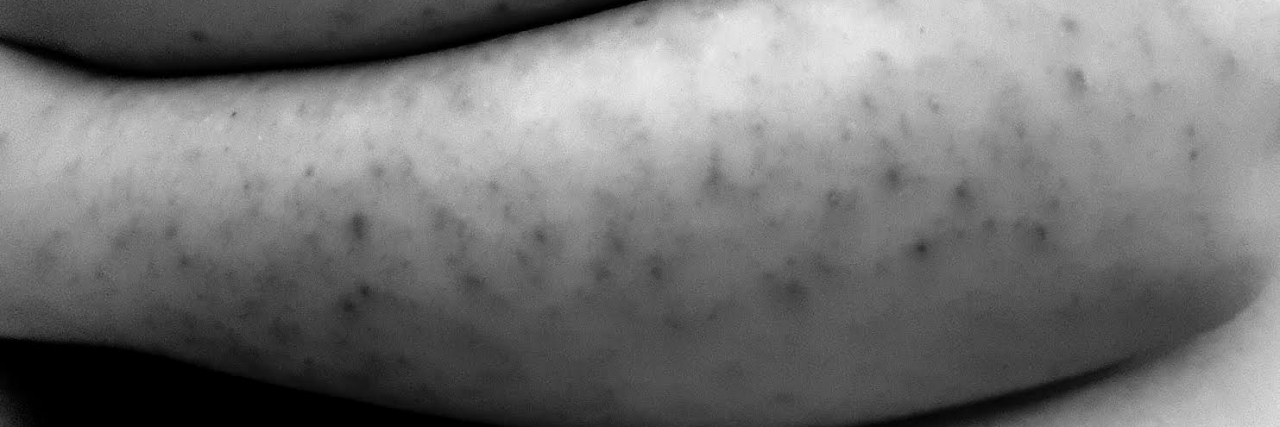“My arms? Oh, um, it’s a skin condition…kind of like eczema.”
I’m so tired of saying it I nearly choke on the words. But it’s the answer I would rather give than, “Oh, um, it’s from me obsessively picking my own skin until I scar myself.” There is some truth to it – I do have a skin condition considered a “cousin” to eczema, and it’s called keratosis pilaris. I have had it all my life, and it causes little bumps to appear sporadically on my skin, specifically on my arms. It wasn’t until somewhere in 2013, at the age of 23, when I slowly started popping and picking to make them go away, and at first it was just an occasional thing. In early 2015, it viciously spiraled.
Dermatillomania (a.k.a. excoriation disorder) is estimated to be prevalent in up to 5.4 percent of the population. It is classified as a body-focused repetitive behavior (BFRB), and it shares that classification with trichotillomania (hair pulling/plucking). Ironically, I’m no stranger to mental illness knowledge as I’m in a graduate program to become a LPC (Licensed Professional Counselor) and CADC (Certified Alcohol and Other Drugs of Addiction Counselor). For years before this, I buried myself in these sorts of studies. Why had I never heard of this debilitating and life-consuming disorder before seven months ago? How did I get through psychology course after psychology course in my undergraduate years without even the slightest mention of BFRBs? Why have I gone 10 months in a graduate program specifically for mental health counseling and addictions, yet this hasn’t been brought up once?
I had absolutely no knowledge of BFRBs until I was on Facebook and came across an article about it on BuzzFeed. I was of course relieved at first to know I’m not the only person in the world who can’t stop destroying her own skin – apparently I’m not alone. But I’m so incredibly disappointed because no one seems to know this exists. Research is significantly lacking, and there are only a handful of counselors out there who are specifically trained in BFRBs.
I’ve done my best to take hold of this obsession, and I am pleased to say I’ve done OK in doing so. But what was once bright red, swollen skin all over both my arms became dark brown, splotchy patches with many spots of dense scar tissue. Even though I’ve cut back significantly, I’m still stuck with stares and random remarks and inquiries, along with unwanted pieces of advice. I’ve been told I look “like a crackhead,” “diseased,” and have “permanently ruined my once-beautiful skin.” I’ve been asked, “Why would you do that?” “What is up with your arms?” “Do you have eczema?” and “I noticed your arms – have you tried this cream?” And of course the pieces of advice that are always just fantastically horrible: “Just stop!” or “Distract yourself!” or “It’s because you smoke, so just quit that.” All 5.4 percent of us wish it were that easy. But it’s not, and it never will be.
It was easier to deal with it during winter, when I could just hide behind long sleeves. It’s summer now, and I constantly hold back tears as I lather layer upon layer of makeup on my skin in the attempt to hide the scars and whatever leftover picking I just couldn’t control myself on. It helps a little, but it’s still obviously there and it is so unbelievably hard at the end of the day to not just say “screw it” and pick anyway. Because what’s the point? I’m scarred to the point of no return anyway – my arms won’t ever look normal again. So why not pick and be able to mentally block out all the anxiety I experienced that day? So I obsessively pick any bump, any small scab, any imperfection that my eyes can possibly catch. For that brief moment in time, which can easily become a two-hour event, my continuously anxiety-filled, self-hating, guilt-ridden mind that never slows down is still and quiet. As someone who has also has diagnoses of avoidant personality disorder, generalized anxiety disorder and post-traumatic Stress Disorder (PTSD), that is an amazing and addicting feeling to have because it is so rare to experience.
My mental illness – well, one of them – isn’t invisible. The dots and splotches all over my arms is a loud, embarrassing, 24/7 reminder to me, and everyone around me, that I’m not OK. My arms make me vulnerable and exposed. I am branded by this illness as if it owns me. How do I break free? How do I become proud of any progress I have possibly made?
Knowledge of dermatillomania needs to spread. Because maybe if people like me start to slowly come out of hiding, others may see the scars but also see beyond the shockingly abnormal skin. Maybe people who have this and don’t yet know they are not alone will be able to get help before the condition gets out of control.
We are not our skin. We are so much more than that. Unfortunately, it’s what people see first and what they see most. If you love and care for someone who struggles with dermatillomania, make sure you are lifting them up with kind words and support – not dragging them down.

